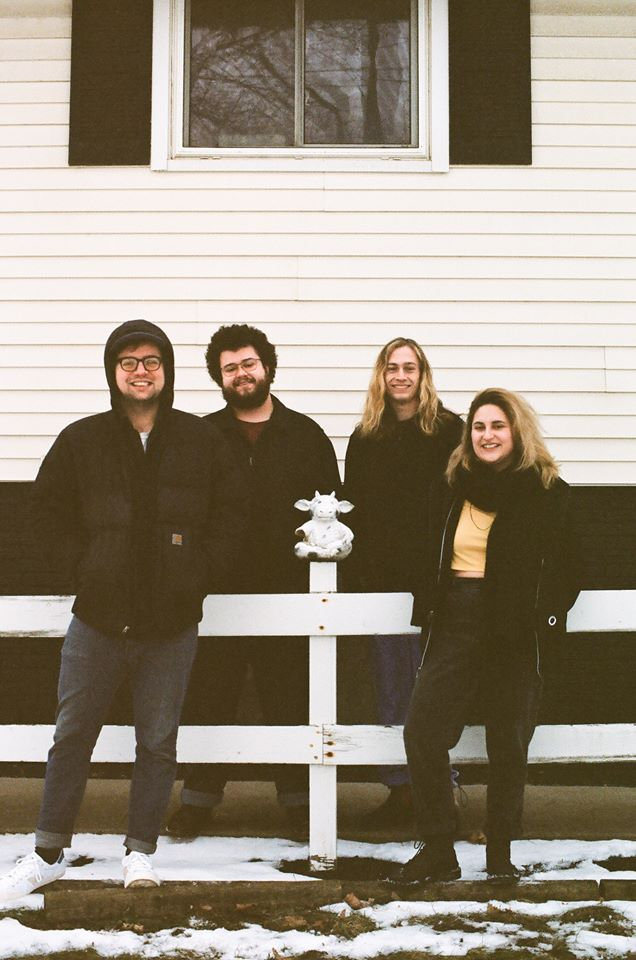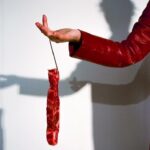Interview: Full Body on ‘Always There’
Posted: by The Alt Editing Staff

Full Body is a genre-bending post-rock band from Rochester, New York. Their latest release Always There is a giant blend of sound with an emphasis on guitar and rhythm. The album is out now on Five Kill Records, and Sarah got the chance to chat with the band about the record, community, and the recording process leading up to their LP.
So first, just wanted to say congrats on the new record, it sounds amazing. Take me through the process of developing the sound for this record, what was the songwriting process like?
Dylan Vaisey: We’ve been through a lot of line-up changes and really wanted to record an album but we only had a few ideas. We went ahead and booked three days at the Headroom in Philly with Scoops Dadaris. He’s worked with a bunch of other cool bands. Essentially, we wrote about half of it, roughly 4 other songs, before coming in the studio. Through the process of our time spent in The Headroom, and then Scoops coming to Rochester, New York, which is where we’re from, we did another three days with him just putting the finishing touches on everything. So the record took about 6 days. Most of it happened in studio.
Jack Chaffer: Yeah, we started the songwriting process around February of 2018. We had written, “Small Voice (Still)” and that was the first song we wrote for the album. It really started there as far as new material goes. From that point on, the rest of the songs we wrote were based on who we wanted to work with and who we wanted to record with. That really gave us the sound that we were looking for.
I guess one thing I’ll add from what was different about this process from our last record What’s Good? (which was pretty much live tracks entirely). We pretty much had everything beforehand. We had an idea of what the songs should be like. So going into this, where we pretty much had everything half written was a bit more hands-on than before. Working with Scoops was like having an objective member who gave us insight about where the songs should go. So I think that was a pretty big difference in sound, and exploring tone, and Scoops was very encouraging in giving us direction.
So it sounds like the record really came together in the studio. Which brings me to my next question, production wise, what aspects of production were important to you during recording?
Jack: I think what was really cool about The Headroom in general was the drum sound. It’s really really nice. For me, that was a big aspect because for most bands they want their drums to sound good. Like for instance, when we were recording, Scoops had the idea of using an Mapex Sledge Hammer Snare, which was really cool. I bought it afterwards because I loved it so much, gotta love those brass snares.
Jack: I think we all wanted to level-up, sort-of-speak, production wise and overall in quality from our last record. I think we wanted a presence and we wanted to sound full, kind of like our band name. We wanted to sound full, present, and modern sounding. It was the most fun I’ve probably ever had, just writing in the studio. I guess it helped our original goal which was to make use of the tools that we had. To sound modern which is really the right word to use to associate with the record. That this record was not a record that came out in the 90’s. We just wanted to harness that raw quality and make it a bit more modern.
I can definitely feel that on the record. That it does have a fuller sound as far as your previous releases are concerned. I was reading on your bandcamp that one of our editors, Eli Enis, points out Pile and Elliott Smith as points of reference. So what were you listening to while making this record? Maybe some artists that you build Full Body’s sound off of.
Jake: So we recorded the record in September of last year. I remember listening to a lot of Yes, kind of thinking in the Prog range. I feel like we have a bit of a prog approach to our songwriting, but in a modern sense. Using kind of cool 90’s alt-guitar music but with a prog approach. That’s one band that really sticks out to me.
Jack: Definitely, Elliott Smith. Especially the later stuff, like Figure Eight. The production on that is cool and obviously the songwriting is insane. We were really into just everything about that, from the guitar tone, how to make the guitar feel a certain way.
Dylan: When did that Stove record come out?
Jake: Oh yeah, the new Stove record, that was great. Also, that came out right before we were finishing up things and that record we loved just for the guitar tones, and songwriting in general. We really felt connected to that album and it kind of bleed into our work the next three days. It’s just a great album.
Dylan: I was listening to a lot of hip-hop and that type of stuff. Like, JPEGMafia is a huge influence. I think their music kind of breaks the boundaries of production. He can go one way for one half of a song and then swing another way. I think the second song on that record it starts with a drum machine and then opens up in the chorus. That’s when the real drums come in. Just kind of doing stuff like that; taking the songs we have and trying to expand on them. I’ll say that hip-hop is a huge aspect. Jake is also into Yellow Magic Orchestra.
Cool, I also loved that Stove record, it was really really good. Now that I think of it, I can hear some elements of Stove baked into Always There. I know you spoke about contemporary and modernism, and I think one of the things we’re trying to revive is DIY. I know that Full Body has kind of grown out from the DIY scene in Rochester, can you speak a little bit about your experience in DIY? How the DIY scene in Rochester holds value to you as a band?
Dylan: Yeah, for me, I grew up in Rochester, in a suburb. I think everyone except Jake did. Jake grew up in Ithaca. I just started playing drums in a band and got exposed at around 16 or 17 to the Rochester underground scene. I guess any city that has any type of organization no matter how big or small is important for musicians to be able to have that type of community. That goes for any artists as well. Rochester is cool, I think a lot of people gave us a chance to play shows. A lot of spaces in Rochester, mainly, now gone, Vineyard Community Space. That gave us a chance to, like you said, kind of come up in the DIY scene and allow us to test things and try songs. It was very freeing to sometimes do really well when we didn’t know to expect. Sometimes fall on our faces and get back up. I think Rochester is a great place to do that. Sometimes, shows there are packed and that can add more pressure. I think it’s location, geographically, and the scene in general is conducive for bands to figure themselves out. We were lucky, and just given a lot of opportunities early on. We’re really thankful for that. I’ll give a shout-out to Rut, they’re putting out a new record. Also, Attic Abasement, they grew up in Rochester. The scene as a whole just gave us some great opportunities, plus Rochester is a pretty cheap city to live in.
Jack: I went to some house venue in Rochester when I was 19, and I didn’t know anyone. I just saw on Facebook. Some person I recently added was going to a show with Adult Mom and a few other bands. One of the bands was Full Body, and I liked the experience so much even though I didn’t know anyone. I actually went back even though I didn’t know anyone, everyone seemed really friendly. There are places that pop up and things that happen that are really cool there sometimes. Even for someone who isn’t really involved can come out and experience it, who knows what can happen.
Dylan: Also shout out to Small World Books, they’re a bookstore by day and by night they put on shows. That’s probably our favorite venue as a group in Rochester.
Speaking of Upstate and venues, I know that y’all have toured a lot and have definitely been to your fair share of venues. What have been some of your favorite bands that you’ve played with or toured with?
Dylan: There’s this band from Philly called they are gutting a body of water.
Love that band.
Dylan: They’re a pretty big influence on us and Doug, Doug Dulgarian, I’ve known him for a while. When I ran a house venue I booked his other band, Jouska there. Yeah, so we went on tour with they are gutting a body of water and that was one of my favorite tours. We also went on a tour with Rut and that was easily one of the most fun tours we’ve ever done.
Jake: Our first tour was with Hate Club from Albany and that was our first extended tour beyond doing weekenders. That was really great because a big part of that was, we were all just in a bus together. Usually when you’re touring with another band, at least for us, you’re kind of in separate vehicles. So it’s cool to be in the same space together on the road. We also like hanging out with folks and getting to know people, sharing experiences and such.
Jack: Also Tosser, they’re great.
All of the bands you’ve listed I’ve been fans of but speaking of Albany, I know you released Always There on Five Kill Record which is based in Albany. What has been your experience working with them?
Dylan: Our experience with Five Kill has been a very informative one. I think one of the hardest parts of making music is finding people who support you. I think that Five Kill helped us get in on some really cool Albany shows. They’ve helped with PR a lot which is something that we’re pretty inexperienced with and are learning more every day. They’ve definitely helped us in areas where we may have not tapped into yet. I’d say largely they’ve been very helpful. We’ve been very communicative and they’ve been very receptive. Any questions or concerns we had they were able to answer them.
Sounds like they’ve helped y’all out a lot. It sounds like as musicians and as a band you’re constantly trying to support other artists and bands, but as a band yourself, what standards do you hold yourself to, what are the core tenets of Full Body?
Dylan: I think we hold ourselves to a pretty high standard, and sometimes there’s a constant balancing act between your aspirations and your goals. I think musically, and as a band, there’s a dichotomy between what you can do and what you want to do. Because we hold ourselves to a certain standard, we’ve definitely grown a lot. The ideas musically have been there for a long time. I didn’t know how to play guitar when I first started in 2015. I just really liked to sing. I just took it up as something that I wanted to do before I die or something. It’s just been a balancing act, like a riff that we had in mind that is just really tough to play. Just getting tight as a band, it’s tricky to lock into. We’re constantly aware of how we can improve without being too hard on ourselves. Again, just that balance of how we can improve and keep expanding the sound. Also, DIY as a whole is a big aspect of what makes this worth doing. I think it’s a big part for all of us to be a part of the Rochester scene and be inspired. We definitely surround ourselves with people and bands who constantly inspire us or make us think critically. We really try to give that support back in as many ways as we can.
Jake: Yeah, I think one thing we always try to consider is maintaining a sense of accessibility. Although it’s fun to play with weirder grooves or rhythms and have a lot of different dynamic changes. At the end of the day we want people to nod their heads to our music and stay engaged with the music. For them to feel something that’s familiar. but also be above expectations. Maybe to question what rock music could be, or can be, and making sure that guitar based music can still be interesting and worth putting time into. Something that they can connect to, but not alienate them at the same time. Again that balancing act of being interesting but also not alienating their audience.
Dylan: Because this question isn’t really about the album, Cass, our bassist, joined after the album was recorded. We just had a good friend filling in for us for a while, shout out to Kyle. Do you have anything to say?
Cassidy: Thanks, I just wanted to add on to what you were saying, Dylan. I just think from the new experiences I’ve had touring and playing with the band, we really respect each other and respect other people. Through the Rochester community in general, but also a lot of other communities and other places we’ve been to. How you respect them and how you respect and support each other goes a long way. I’ve gotten that from day one of being with this band.
Jack: We really go to every show we play just trying to do the best we can to make it a great show. We really just appreciate people allowing us to be a part of their spaces and play our music. Also playing with other bands who we may not have ever seen if we hadn’t played that show. Even on the last couple of days of this tour, we’ve met amazing people and have seen amazing bands. The feeling we all have in ourselves and what we need to do to be better. Just seeing other groups and artists and musicians doing the same thing and keeping it real is great.
Cassidy: One thing I’ll add is that from Day 1 of joining this band, I remember you all said “just have fun”. That we’re not all just heads down trying to get this stuff done but also to have fun as well. Having fun with the people we work with is important.
I think all of you said really great things about respecting each other but also a part of being in a band is growing and certainly that came across on your LP. What do you hope people take away from listening to Always There?
Dylan: What I want people to take away is that, what I feel we do differently from other bands is, our form. How many parts we have in a song, not that it needs to be that way, but expanding on a verse-chorus thing. We do have some songs that are like that, but what I take pride in, in our band, is our form and how we layer parts instead of sectioning them off. I think we do a great job in making songs that sound coherent but maybe not having them go where you expect them to go. I think our music is really accessible, even though I scream and sing, that people can take something away from it and that rock music doesn’t always have to sound the same as it has. Just also, enjoy it. I hope that they’re entertained and that people like it and are excited about it.
Jake: I guess one thing that I think about is that the songs are pretty different. A lot of the songs have different feelings to them, some are more post-rock, some are more hardcore, or sludgecore, or post-hardcore. I think the main takeaway is that if you want to play rock music in 2019, it’s important to see what else is out there influence wise, and to play around with genres. Don’t try to limit yourself, you can still be in a rock band and still be influenced by hip-pop or electronic music or whatever. Just being patient and letting that process allow you to remain open. There’s still relevance to playing rock music because of all of the different choices we have.
Dylan: I think you nailed it when you said playing with genre. That’s something I didn’t think about when you asked the question, but that resonated with me. Even if you resonate with one genre like “we’re an emo band” or “we’re a shoegaze band” more power to you. But if you’re like us, and you like a lot of stuff, I hope that we encourage people to not feel limited.
Jack: I would like if someone listened to the record and came to see us live.
Follow Full Body:
The Alternative is ad-free and 100% supported by our readers. If you’d like to help us produce more content and promote more great new music, please consider donating to our Patreon page, which also allows you to receive sweet perks like free albums and The Alternative merch.
_
Sarah Knoll










